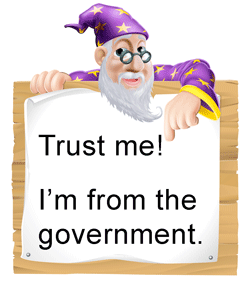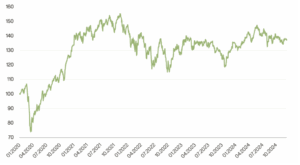 The presidential debate sparked a firestorm of media frenzy. Focusing on Biden’s foibles obscures the real problem. Both parties scream their opponent is a compulsive liar, corrupt, unfit to serve – implying that voters can solve our country’s problems by voting correctly in November. They’re lying! Ain’t gonna happen no matter what the outcome.
The presidential debate sparked a firestorm of media frenzy. Focusing on Biden’s foibles obscures the real problem. Both parties scream their opponent is a compulsive liar, corrupt, unfit to serve – implying that voters can solve our country’s problems by voting correctly in November. They’re lying! Ain’t gonna happen no matter what the outcome.
If you are looking for a partisan message, you’re not going to find it; the political class works together for their own best interest. M.S Evans explains:
“We have two parties here, and only two. One is the evil party, and the other is the stupid party. .… Occasionally, the two parties get together to do something that’s both evil and stupid. That’s called bipartisanship.”
No matter which party reigns, the beat goes on, wasting trillions to foster political power.
 The politicos have racked up almost $35 trillion in debt, and are on the hook for another $200+ trillion in “unfunded promises.” Together they broke it, make no reasonable attempt to fix it, and they want voters to believe they can change their spots and right the ship. Fiscal sanity? Impossible – an unnatural act for the ruling class.
The politicos have racked up almost $35 trillion in debt, and are on the hook for another $200+ trillion in “unfunded promises.” Together they broke it, make no reasonable attempt to fix it, and they want voters to believe they can change their spots and right the ship. Fiscal sanity? Impossible – an unnatural act for the ruling class.
When is the mainstream media going to finally admit we are past the point of no return?
Sanity
Each quarter I speak with Urs Vrijhof-Droese, Managing Partner at WHVP. They manage some of my IRA offshore. Urs is a true expert on foreign investments and currencies. We invest in assets denominated in different currencies to hedge against inflation, loss of value of the US dollar.
The US isn’t alone in destroying their fiat currency with deficit spending. The challenge is finding currencies you “trust” will hold their value.
Their recent newsletter, “Stay Calm and Curious”, explains:
“Too Much Debt BIS Warns
…. The nations debt has reached levels that give them little leeway for potential accidents. According to the Bank for International Settlement (BIS), one major risk is the historically high private and public debt levels that lead to drastically reduced monetary and fiscal policy headroom. …. The BIS acknowledges that households are decreasing their savings further.

…. The European Central Bank (ECB) urges its members to cut high debt levels. Of the 20 members, France, and six other countries, were reprimanded by the European Commission for breaching EU fiscal rules.
…. Expectations are that government spending will tend to increase further due to stipulated challenges that are coming up within the next decades.”
It’s time to check in again with Urs for his global perspective.
DENNIS: It looks like much of the world is catching on; we may be in the early stages of a potential “debt revolution” at the ballot box. We have seen changes in Argentina, elections taking place in the UK and France. Japan tried to prop up the yen and failed.
Urs has to decipher not only what’s going on, but the investment implications.
Urs, what do you make of the situation in Japan, Argentina and Europe? I’ve read reports where Argentina’s inflation rate is quickly coming down.
URS: Thank you, Dennis, for inviting me to address your readers again. It’s a pleasure to be back.
Politicians often aim to please the public to secure their positions, yet they frequently overlook the responsibilities that may not always win popular approval. Japan’s ability to maintain a high debt level, while avoiding high inflation for so long, is remarkable. However, this significant debt restricts the central bank’s capabilities.
In Argentina, high government spending is much more detrimental. President Milei has been forthright about the painful measures needed to control inflation. Transitioning from hyperinflation to a recession, resulting in deflation, is evident in Argentina’s current situation.
Europe, on the other hand, remains functional, but the trend of increasing debt is undeniable and seems irreversible. The European Union’s complexity, with its many member countries, presents many challenges.
DENNIS: We hold one investment in Japanese yen and have seen the yen consistently trend down. Which currencies do you see as potentially rising versus those which may be falling in value?c>URS: The Japanese yen has depreciated significantly, largely due to the substantial interest rate differential between Japan and other countries. Until recently, the BOJ’s negative rates made the yen less attractive.
Today, the Swiss franc stands out as a currency likely to appreciate further over time. When evaluating currency value, the debt-to-GDP ratio and overall economic performance are major factors.
The Australian dollar (AUD) could appear as an attractive currency; Australia’s debt-to-GDP ratio is still below 60%. It bears watching closely as the ratio has been rising, yet it appears to be stabilizing.
The Japanese yen, despite its recent decline, has future recovery potential. Much of the yen’s depreciation has been driven by hedge funds and speculators. I feel the yen is undervalued against the US dollar.
DENNIS: What do you expect from precious metals?
URS: With all the uncertainty in the world, precious metals can play a valuable role in a diversified portfolio. They’re a hedge and a long-term store of value. As you know, there can be extended periods of underperformance. Incorporating precious metals should be factored as part of a broader wealth management strategy.
DENNIS: I’ve been itching to ask you this question. I asked historian Richard Maybury what the US should do to right the ship. He paid Switzerland quite a compliment:
“The president should make this announcement:
‘In one year, the US will cease being the policeman of the world. Other governments should immediately begin using this year to arrange for their own defense.’
…. We recommend adopting the Swiss system of neutrality including a heavily armed and trained citizen militia. The Swiss system is proven to work. Despite being located in the center of the bloodiest part of the planet – Europe – the Swiss have not been in a foreign war for five centuries.”
|
Special Offer ONLY for Miller On The Money Readers! As you know, I’ve mentioned Richard Maybury’s Early Warning Report often, and I’ve been a reader for many years. Richard’s world outlook is unique, and his letter provides great education you will not find elsewhere! For a limited time, he is offering Miller on The Money readers a phenomenal deal. Click here right now to subscribe for just $99. This saves you $201 OFF the regular subscription price! You’ll immediately be emailed the current issue and 4 FREE Special Reports. I encourage you to click here and take advantage of his special offer while you still can. |
Urs, Switzerland has a five-century track record of not only staying out of wars, but also reasonable fiscal governance as compared to much of the world.
What makes Switzerland so different?
URS: The idea of adopting Switzerland’s approach to military and fiscal governance is intriguing. Switzerland’s armed neutrality relies not just on a strong military, but also on the acceptance by other nations of its neutral stance. If major powers like the US, China, or Germany chose to invade, Switzerland would struggle to defend itself. That said, Switzerland remains an unattractive target due to its lack of significant resources.
Richard Maybury highlighted the extensive international involvement (meddling) of the US, which has garnered many adversaries. In contrast, Switzerland maintains true neutrality, allowing other countries to govern themselves without interference.
Switzerland’s strength lies with an educated populace and its long-standing role in mediating international disputes. The system works because it’s deeply embedded in the culture and values of its people.
DENNIS: The US recently demanded Switzerland change its laws regarding US clients or you would suffer punishment.
Government propaganda has our citizens brainwashed about “secret” numbered bank accounts in Switzerland. When we told friends about our Swiss account, their automatic reaction was “money laundering tax cheats.”
I’d guess many world leaders have accounts in Switzerland, and it is in their personal best interest to leave you alone.
URS: Hiding money in Switzerland is largely a thing of the past. The issue arose because, legally, Switzerland didn’t, and still doesn’t have, the responsibility to ensure that foreign clients report their accounts back home. It reflects Switzerland’s policy of non-interference in other countries’ governance, and wish other countries would allow us the same.
International figures, including dictators, value Swiss banks for their stability, expertise, and adherence to the rule of law. However, having an account in Switzerland does not protect them from prosecution if their funds are found to be sourced from criminal activities, as Switzerland complies with international laws.
DENNIS: A combo final question. The common metric for debt being past the point of no return is around 120% of GDP. Japan is well past that; the US will be soon. I see where several countries in Europe were “reprimanded” by the European Commission.
What happens to members of the EU if they surpass the limits?
On a bigger scale, when big countries are so far in debt it can’t be repaid, is anything safe? Who do YOU trust?
URS: The debt-to-GDP ratio is a critical metric, but things like budget deficits should be considered.
France and six other EU nations have been “reprimanded” by the ECB. Given the recent outcomes of the French elections, fiscal discipline seems unlikely.
Non-compliance with debt limits results in warnings and, eventually, fines, which are ineffective; not addressing the underlying issue of overspending and high debt levels.
Heavily indebted countries struggle to right the ship. An economy burdened with debt doesn’t necessarily mean there are no good investment opportunities. For example, the US has many successful businesses.
 Personally, I tend to trust certain companies over governments, particularly those that have demonstrated financial sustainability and resilience through difficult economic and political times. This is where I prefer to invest both my own money and my clients’ money.
Personally, I tend to trust certain companies over governments, particularly those that have demonstrated financial sustainability and resilience through difficult economic and political times. This is where I prefer to invest both my own money and my clients’ money.
Dennis here. I feel the nations of the world coordinated their currency devaluations to maintain relative currency parity. Artificially low rates and government deficits are now taking their toll in many countries.
Worldwide investing is a huge Ouija board, some countries will act responsibly, while others won’t. What will the US do? Owning gold, and not holding all your investments in a single currency, is the best way to protect your wealth.
| Editor’s note: I’ve been a client of WHVP for over a decade. I have an offshore account, with investments around the world in foreign currency as a hedge against inflation of the USD. I have no other financial arrangement with them of any kind, no referral fees, kickbacks – nothing.
An offshore asset manager is a great diversification method for those who are so inclined. I am happy to give them a forum in exchange for sharing their global perspective for our readers’ benefit. |
|
Help keep us online! I love it when readers thank me for “telling it like it is” for providing content they won’t find in the mainstream media. I’ve been sent to Facebook purgatory a few times – they didn’t approve. Free speech isn’t appreciated in all circles. When I started Miller On The Money, I vowed to keep our newsletter FREE! I’ve kept my promise – our weekly letter is an expensive hobby. Donations are our primary source of financial support, and what keeps us going. We don’t peddle your name to anyone. I’ve turned down proposals from advertisers, feeling their offerings were inappropriate for our readers. Readers pitching in to help offset our cost are much appreciated. It’s strictly voluntary – no pressure – no hassle! If you want to help, click the DONATE button below. You do not have to sign up for PayPal to use your credit card. And thank you all! |
On The Lighter Side…
I’d like to try something different this week, with your help.
With the shape of our country politically and financially, a lot of people are stressed.
 Sometimes silly stuff, followed by a good laugh, can lighten things up. Life still needs to be fun. Why not?
Sometimes silly stuff, followed by a good laugh, can lighten things up. Life still needs to be fun. Why not?
Silly stuff??? Last week I was in my office and Jo was sitting on the back porch with the cat. I took my phone and sent her a text, inviting her to lunch – stating it would be like a real date. A few minutes later, grinning, she walked in and asked why the text. I explained that I was too shy to ask her face-to-face.
When she declined my invite, I told daughter Holly that I felt like I heard, “I only like you as a friend.” A hearty belly laugh was had by all.
One more example. When Holly was young, we had a friendly battle over the car radio. You had to push buttons to change stations. I’d want music from our generation, where she wanted Guns & Roses, AD/DC, her generation. We were continually grinning and pushing our buttons while driving.
I secretly changed the radio where every button was on “our” channel. They dropped me at the airport, and no sooner than I was out of the car, she punched the button for “her” station. Didn’t work. She frantically started punching buttons.
Jo knew what was going on and laughing, and Holly quickly figured it out. When I got home, all the buttons were on “her” station.
What’s my point? Sometimes absolutely silly stuff is not only good for a marriage, but also a family creating laughs that are shared for decades.
I’m toying with the idea of writing a “Silly Stuff” article (not sure yet). I’d love for readers to share some of your stories. If I get enough and find myself laughing, I may want to change the mood one week and share the stories. If you submit a story, I’m assuming I have permission to use it. I never use last names so it would be Joe S. writes – kind of thing. Send them along and let’s see where it goes. dennis@milleronthemoney.com
If this is NOT something you would be interested in, please let me know also.
And finally…
Next week I’ll resume my normal closing remarks.
Until next time…
Dennis Miller
“Economic independence is the foundation of the only sort of freedom worth a damn.” – H. L. Mencken
Affiliate Link Disclosure – This post contains affiliate links. If you make a purchase after clicking these links, we will earn a commission that goes to help keep Miller on the Money running. Thank you for your support!




